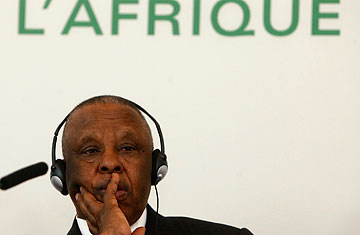
Festus Gontebanye Mogae, the former president of Botswana, pauses during a news conference in 2007
Anyone who has watched Robert Mugabe this year, as the 84-year-old dictator of almost three decades railed against colonial phantoms while stealing an election, ruining the economy and starving his people, might be tempted to take Zimbabwe as the story of Africa. But if Mugabe is the most famous living example of an African tyrant, evidence of a very different Africa has never been far away. Botswana, which shares a border with Zimbabwe, has for decades been mainland Africa's brightest star, a country that has gone from dustbowl poverty to middle income status in a generation, where elections are peaceful, politicians retire voluntarily, civil society is vibrant and where natural resources (in Bostwana's case, diamonds) are not a curse or a spur to corruption and violent theft, but a blessing shared by all.
On Monday, that achievement was recognized when the Mo Ibrahim Foundation awarded its annual good governance prize to Festus Mogae, who retired this year after two five-year terms as president. The prize achieved instant recognition when it was inaugurated last year because of its hefty cash incentive: $5 million over 10 years, $200,000 a year after that and an additional $200,000 a year for good causes espoused by the winner.
This year the award panel, which includes former U.N. secretary-general Kofi Annan, former Irish President Mary Robinson, and Nobel peace laureates Mohamed ElBaradei and Martti Ahtisaari, praised Mogae's "outstanding leadership." Mogae had "ensured Botswana's continued stability and prosperity in the face of an HIV/AIDS pandemic which threatened the future of his country and people" but which is now declining thanks to "one of Africa's most progressive and comprehensive programs for dealing with the disease."
His economic management, they said, produced "remarkable growth," stymied inflation, attracted investment and allowed him to pursue diversification away from diamonds, while simultaneously using tax revenue to fund investment infrastructure, health and education. All this, while maintaining a "tough stance against corruption."
The contrast to Mugabe's murderous and inept kleptocracy could not be starker. But in conversation on Monday, Ibrahim insisted Mugabe, not Mogae, was increasingly the exception in Africa. Ibrahim is a Sudanese telecoms billionaire who decided to put his money where his mouth was after concluding that poor governance was the bane of the continent. "African leadership was a failure, and its own failure," he says. "You can't sit here and blame colonialism forever."
Since launching his foundation, however, Ibrahim says he had been surprised to discover that his impressions were increasingly historic. "Ten or 20 years ago, the African archetype was an autocratic country, with one state television station, one state newspaper and one state radio broadcaster," says Ibrahim. "That's no longer the case. Suddenly civil society is active. There are thousands of young Africans who are educated and getting on with it. Everybody speaks to everybody now. People's lives are no longer a monopoly of the government."
The problem is, that the world has been slow to recognize the change. "I am sure I am going to hear people say, 'Who is Mogae? Like last year, people said: 'Who is Chissano?', says Ibrahim, referring to inaugural winner, former Mozambique President Joaquim Chissano, another of Mugabe's neighbors who stepped down peacefully and voluntarily. "But everybody knows Mugabe."
Ibrahim is optimistic, even for Africa's trouble spots. This year's violence in Kenya and Zimbabwe, for instance, conforms to the old stereotype of Africa. But "what also happened in Kenya and Zimbabwe was that millions and millions of Africans lined the streets to vote," says Ibrahim. "It showed Africans cared about democracy, want to exercise their rights and they made it very clear that they would not allow anyone to steal their elections." That, says Ibrahim, is also a "great story."
(Click here for photographs of Botswana's diamond industry.)
(Click here for photographs of political tension in Zimbabwe.)
